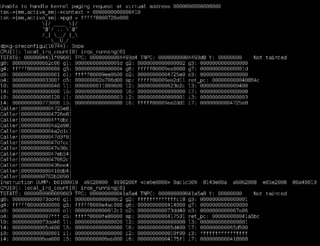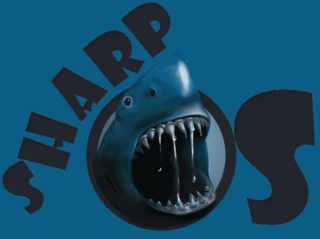Related Research Articles

GNU Hurd is the multiserver microkernel written as part of GNU. It has been under development since 1990 by the GNU Project of the Free Software Foundation, designed as a replacement for the Unix kernel, and released as free software under the GNU General Public License. When the Linux kernel proved to be a viable solution, development of GNU Hurd slowed, at times having slipped intermittently between stasis and renewed activity and interest.

Plan 9 from Bell Labs is a distributed operating system, originating in the Computing Science Research Center (CSRC) at Bell Labs in the mid-1980s, and building on UNIX concepts first developed there in the late 1960s. The final official release was in early 2015.
BitKeeper is a software tool for distributed revision control of computer source code. Originally proprietary software, it was released as open-source software under the Apache License 2.0 on 9 May 2016. BitKeeper is produced by BitMover Inc., a privately held company based in Los Gatos, California and owned by its CEO, Larry McVoy, who had previously designed TeamWare. BitKeeper is no longer developed.
Linux malware includes viruses, Trojans, worms and other types of malware that affect the Linux operating system. Linux, Unix and other Unix-like computer operating systems are generally regarded as very well-protected against, but not immune to, computer viruses.

Matthew Dillon is an American software engineer known for Amiga software, contributions to FreeBSD and for starting and leading the DragonFly BSD project since 2003.
The Linux kernel mailing list (LKML) is the main electronic mailing list for Linux kernel development, where the majority of the announcements, discussions, debates, and flame wars over the kernel take place. Many other mailing lists exist to discuss the different subsystems and ports of the Linux kernel, but LKML is the principal communication channel among Linux kernel developers. It is a very high-volume list, usually receiving about 1,000 messages each day, most of which are kernel code patches.
Keith Packard is a software developer, best known for his work on the X Window System.

LWN.net is a computing webzine with an emphasis on free software and software for Linux and other Unix-like operating systems. It consists of a weekly issue, separate stories which are published most days, and threaded discussion attached to every story. Most news published daily are short summaries of articles published elsewhere, and are free to all viewers. Original articles are usually published weekly on Thursdays and are available only to subscribers for one week, after which they become free as well. LWN.net is part of Eklektix, Inc.

In computing, an oops is a deviation from correct behavior of the Linux kernel, one that produces a certain error log. The better-known kernel panic condition results from many kinds of oops, but other instances of an oops event may allow continued operation with compromised reliability. The term does not stand for anything, other than that it is a simple mistake.
A proprietary device driver is a closed-source device driver published only in binary code. In the context of free and open-source software, a closed-source device driver is referred to as a blob or binary blob. The term usually refers to a closed-source kernel module loaded into the kernel of an open-source operating system, and is sometimes also applied to code running outside the kernel, such as system firmware images, microcode updates, or userland programs. The term blob was first used in database management systems to describe a collection of binary data stored as a single entity.

Kernel-based Virtual Machine (KVM) is a virtualization module in the Linux kernel that allows the kernel to function as a hypervisor. It was merged into the Linux kernel mainline in kernel version 2.6.20, which was released on February 5, 2007. KVM requires a processor with hardware virtualization extensions, such as Intel VT or AMD-V. KVM has also been ported to other operating systems such as FreeBSD and illumos in the form of loadable kernel modules.

The Linux Foundation (LF) is a non-profit technology consortium founded in 2000 as a merger between Open Source Development Labs and the Free Standards Group to standardize Linux, support its growth, and promote its commercial adoption. It also hosts and promotes the collaborative development of open source software projects.
Linux began in 1991 as a personal project by Finnish student Linus Torvalds: to create a new free operating system kernel. The resulting Linux kernel has been marked by constant growth throughout its history. Since the initial release of its source code in 1991, it has grown from a small number of C files under a license prohibiting commercial distribution to the 4.15 version in 2018 with more than 23.3 million lines of source code, not counting comments, under the GNU General Public License v2.

SharpOS is a computer operating system based on the .NET Framework and related programming language C#. It was developed by a group of volunteers and presided over by a team of six project administrators: Mircea-Cristian Racasan, Bruce Markham, Johann MacDonagh, Sander van Rossen, Jae Hyun, and William Lahti. It is no longer in active development, and resources have been moved to the MOSA project. As of 2017, SharpOS is one of three C#-based operating systems released under a free and open-source software license. SharpOS has only one public version available and a basic command line interface.

Phoronix Test Suite (PTS) is a free and open-source benchmark software for Linux and other operating systems which is developed by Michael Larabel and Matthew Tippett. The Phoronix Test Suite has been endorsed by sites such as Linux.com, LinuxPlanet and has been called "the best benchmarking platform" by Softpedia.
Proprietary firmware is any firmware on which the producer has set restrictions on use, private modification, copying, or republishing.

The Linux kernel is a free and open-source, monolithic, modular, multitasking, Unix-like operating system kernel. It was conceived and created in 1991 by Linus Torvalds for his i386 based PC, and it was soon adopted as the kernel for the GNU Operating System, which was created as open source and free software, and based on UNIX as a by-product of the fallout of the Unix wars. Since then, it has spawned a plethora of operating system distributions, commonly also called Linux.

Emma Jane Hogbin is a Canadian technical writer and free software advocate who lives in Dartmoor, United Kingdom. She is active in Drupal and the Bazaar version control system in different capacities and has contributed documentation to the Linux Documentation Project. She also speaks at various events on a range of technical and social topics. She is a member of Ubuntu Women, a group devoted in part to "Encouraging women to participate, for example, to learn to create new FLOSS software, not only to use GNU/Linux software, but to integrate backwards and learn more about it." Hogbin unsuccessfully ran for the Green Party of Canada in the Ontario riding of Bruce-Grey-Owen Sound during the 2011 federal election.
A virtual kernel architecture (vkernel) is an operating system virtualisation paradigm where kernel code can be compiled to run in the user space, for example, to ease debugging of various kernel-level components, in addition to general-purpose virtualisation and compartmentalisation of system resources. It is used by DragonFly BSD in its vkernel implementation since DragonFly 1.7, having been first revealed in September 2006, and first released in the stable branch with DragonFly 1.8 in January 2007. The long-term goal, in addition to easing kernel development, is to make it easier to support internet-connected computer clusters without compromising local security. Similar concepts exist in other operating systems as well; in Linux, a similar virtualisation concept is known as user-mode Linux; whereas in NetBSD since the summer of 2007, it has been the initial focus of the rump kernel infrastructure.
References
- ↑ Andrews, Jeremy (2003-08-05). "Is KernelTrap a Linux site?". KernelTrap. Archived from the original on 2012-03-11. Retrieved 2007-08-18.
- ↑ Andrews, Jeremy (2005-05-06). "KernelTrap: New Home At The Open Source Lab". KernelTrap. Archived from the original on 2012-02-05. Retrieved 2007-08-18.
- ↑ "Jeremy Andrews (Jeremy)". Drupal . Retrieved 2019-03-03.